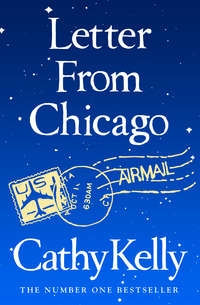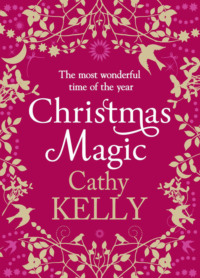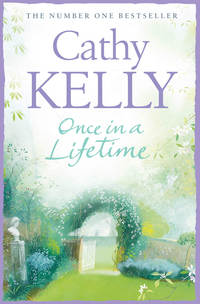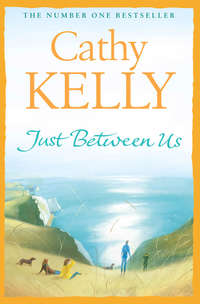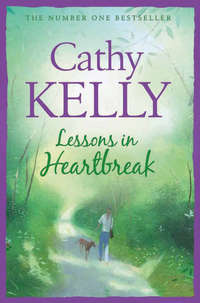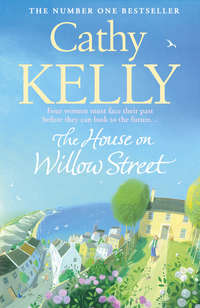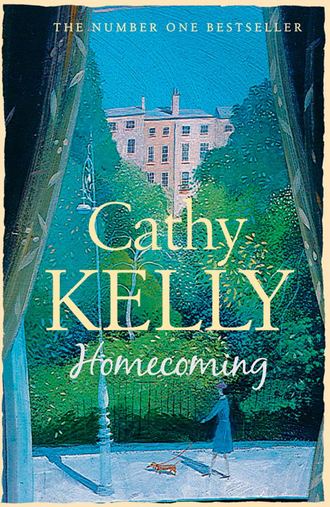
Полная версия
Homecoming

Homecoming
Cathy Kelly

Copyright
Published by HarperCollinsPublishers Ltd 1 London Bridge Street London SE1 9GF
www.harpercollins.co.uk
Published by HarperCollinsPublishers 2010
FIRST EDITION
Copyright © Cathy Kelly 2010
Cathy Kelly asserts the moral right to be identified as the author of this work
A catalogue record for this book is available from the British Library
This novel is entirely a work of fiction. The names, characters and incidents portrayed in it are the work of the author’s imagination. Any resemblance to actual persons, living or dead, events or localities is entirely coincidental.
All rights reserved under International and Pan-American Copyright Conventions. By payment of the required fees, you have been granted the non-exclusive, non-transferable right to access and read the text of this e-book on-screen. No part of this text may be reproduced, transmitted, downloaded, decompiled, reverse engineered, or stored in or introduced into any information storage and retrieval system, in any form or by any means, whether electronic or mechanical, now known or hereinafter invented, without the express written permission of HarperCollins e-books.
Ebook Edition © JULY 2010 ISBN: 9780007411016
Version: 2017-11-21
Find out more about HarperCollins and the environment at www.harpercollins.co.uk/green
Dedication
To my husband, John, and to darling Murray and Dylan, with love
Contents
Title Page
Copyright
Dedication
1 New Year
2 Eggs
3 Bread
4 Vegetables
5 Potatoes
6 Mushrooms
7 Imbolg, festival of light
8 Soup
9 Roasts
10 Feasts
11 Fish
12 Other feasts
13 Spring Equinox
14 Irish Moss
15 Holy Days
16 The Queen of Sheba
17 Food for the Turfcutters
18 The Dairy
19 The Wake
20 Oats
21 Herbs
22 The Homestead
23 Family reunions
24 Weddings
25 Beltane
Epilogue
Excerpt from The House on Willow Street
Prologue
Chapter One
Back Ads
About the Author
By the same author:
About the Publisher
1 New Year
It didn’t take long for Eleanor Levine to unpack her things in the apartment in Golden Square. She’d brought just two suitcases on the flight from New York to Dublin. For a simple holiday, two suitcases would probably be too much luggage. But for the sort of trip Eleanor planned, she was travelling light.
When she’d arrived in the hotel in the centre of the city just two weeks before Christmas, the receptionist had just nodded politely when Eleanor said she might need the room for more than the three weeks she’d booked beforehand. Nothing shocked hotel receptionists, even elegant elderly ladies with limited luggage who arrived alone and appeared to have no due date to leave.
Equally, nobody looked askance at Eleanor when she gently turned down the invitation to book for the full Christmas lunch in the hotel’s restaurant and instead asked for an omelette and a glass of prosecco in her room. After a lifetime spent in New York, a city where doing your own thing and not apologising for it was almost mandatory, it was comforting to find the same behaviour had travelled across the Atlantic to the country of her birth. It wasn’t what she’d expected, truth to tell. But then, it was so long since she’d been home, she didn’t really know what to expect.
On the plane journey, still reeling from having left her warm, cosy apartment and her family behind her, Eleanor had thought about the Ireland she was about to see. She’d left over seventy years before in the steerage of a giant steamship, a serious eleven-year-old travelling to the New World with her mother and her aunt. Their belongings had fitted in a couple of cardboard suitcases, and her mother, Brigid, held the family’s meagre fortune in a purse round her neck.
Now here she was, returning with several platinum credit cards, a line of letters after her name and a lifetime of experience behind her.
Apart from Eleanor herself, only one thing had made both trips: her mother’s recipe book.
Now that she’d put her toiletries in the master bedroom’s en suite bathroom, and had unpacked her clothes and books, she took a white shoebox out of the second suitcase.
Her wedding shoes, white satin pumps from Christian Dior, had lived in the box for many years until she’d given them to her daughter, Naomi, for her prom night.
Now her grand-daughter Gillian borrowed them from time to time, wearing them with the full-skirted vintage dresses that had been all the rage during Mr Dior’s New Look in 1947. Like many modern teenagers, Gillian loved wearing vintage and often visited her grandmother proudly bearing something she’d paid fifty dollars for, and which was a replica of something Eleanor had thrown out twenty years previously. Fashion comes full circle, Eleanor thought, smiling.
Thousands of miles away from Gillian, Naomi and life in New York, Eleanor tenderly opened her box of treasures. None of them were treasures in any monetary sense. But as tokens from a life lived with great happiness, they were treasures indeed. There was a dyed black ostrich-feather mask from a Hallowe’en party, the silk ribbon still tied in a knot from the last time she’d worn it, half a century before. A single pressed rose was visible through the thin layer of tissue in which it lay. Ralf had given her the rose as a corsage one night at a ritzy white-tie affair at St Regis Hotel. Under the tissue, the dried-out petals were feather-light.
There was the shell-like gold compact she’d been so proud of when she was twenty-five, the gold paint tarnished now and the pinky powder nothing but a dusty remnant on the inside rim. There was red lipstick in its black-and-gold case. Manhattan Red. It had been all the rage in 1944, a colour to brighten lips and hearts.
There were love letters, too, from her beloved Ralf, some with humble elastic bands around them; others, bound with ribbon. He’d loved writing letters and cards. There was permanence in the written word, he’d believed. One was the letter he’d penned when their daughter, Naomi, was born, an incredible forty-five years ago.
‘I will love you and our daughter forever,’ he’d concluded. She knew it by heart. Eleanor’s fingers brushed the filmy folded paper but she didn’t open it. She couldn’t bear to see the words written in Ralf’s neat, precise hand. Perhaps she’d be too sad ever to read his letters again.
There were drawings and cards from her daughter, Naomi, so infinitely precious with their big, childish writing. Though it seemed so long ago since Naomi had written them, they still made Eleanor’s heart sing. Naomi had been such a beautiful-hearted child and she’d grown up into an equally wonderful adult.
The third important thing in her treasure box was another collection of writings: her mother’s recipe book. Originally, it had been covered with simple brown card but decades ago Eleanor had glued shiny Christmas wrapping paper on to the cover and now faded golden stars twinkled alongside burnished red and green holly sprigs.
The extra pages, added over the years, made the book bulky, and a lavender wool crocheted rope kept the whole thing tied together. It was all handwritten in her mother’s sloping italics, sometimes in pencil which had faded with age, sometimes in the deep blue ink her mother had favoured.
Like Ralf’s letters and Naomi’s innocent little notes in their awkward writing, the recipe book was a source of huge comfort, a talisman to be held close to her chest when her heart was breaking. It had comforted Eleanor all her life and it comforted her now.
Nobody glancing at the battered recipe book would guess at the wisdom inside it. People, especially people today, thought that wisdom had to come from experts with letters after their names. Eleanor herself had plenty of those – the hoops psychoanalysts had to jump through meant half an alphabet could go after Eleanor Levine’s name.
But two things had taught Eleanor that people with little academic history often knew more than the most scholarly person.
One was her mother, Brigid.
The other was her own vast experience of life.
Eleanor was now eighty-three and she’d lived those eighty-three years with gusto.
Brigid had taught her to do that. And so much more.
Eleanor had been schooled at some of the finest universities in the United States, while her mother had scraped merely a few years of education in a tiny Connemara village school where each of the children had to bring a sod of turf every day to keep the fire alight. Yet Brigid had been born with all the wisdom of the earth in her bones and a kindness in her heart that meant she saw the world with a forgiving eye.
During her years working as a psychoanalyst in New York, Eleanor had discovered that bitterness ate away at people’s insides just as effectively as any disease.
People spent years in therapy simply to learn what Brigid O’Neill had known instinctively.
The recipe book was where she’d written all of this wisdom down for her daughter.
At some point, the recipes and the little notes she’d written in the margins had taken on a life of their own.
Brigid’s recipe book had never really been a simple book of how to cook. It was a book on how to live life, full of the knowledge of a gentle countrywoman who’d lived off the land and had to use her commonsense and an innate Celtic intuition to survive.
Eleanor had often wondered if her mother had more spiritual awareness than normal people. Some sort of instinct that the modern world had lost and was always trying to regain. For certain, her recipe book contained a hint of magic. Perhaps it was just the magic of food and life.
And really, food and life were so intertwined, Eleanor thought.
Her mother’s life had been lived with the kitchen stove always nearby. Feeding people and nurturing them was a gift in itself. The old religions that made a point of the power of the feast had understood that. Food was about hope, rebirth, community, family and a nourishment that went beyond the purely physical.
Like the mashed potato with the puddle of melting butter in the middle and spring onions chopped in that you ate when you were feeling blue. Or the chicken soup made when there was nothing to eat but leftovers, but which when mixed together with skill and love and a hint of garlic became a melting broth that would warm your heart.
Or the taste of fresh berries on juice-stained lips in bed with the man you loved.
Eleanor thought of a man she’d shared a warm bed and strawberries with once upon a time.
Even sixty years later, she could still remember the sheen of his skin and the way her fingers had played upon the muscles of his shoulders as they lay together in a cocoon of love.
It wasn’t something she could share with anyone now. People tended to be scandalised if an octogenarian mentioned sex. Ridiculous, really. A bit like being shocked at the notion that a vintage Ford from the 1930s had ever driven on the roads. She smiled.
She’d told Ralf about that man, her first lover, when they were first courting.
‘I don’t want secrets between us,’ she’d said.
And Ralf had understood. Because he knew that the lovemaking he and Eleanor shared far exceeded anything she’d enjoyed with the man with the strawberries.
Ralf had loved cheese, little bits of French brie dripping off a cracker on to the plate, as they lay in their scrumpled bed and talked after making love.
She’d introduced him to Turkish apple tea, which somehow went with the cheese. He’d showed her how to make kneidlach, the little kosher dough balls he’d loved as a child. Some of their happiest moments – and there had been many, many happy moments – had been spent enjoying meals.
Food made it all better.
She’d loved it when they would wander out for dinner in one of the neighbourhood restaurants, then sit talking for hours after they’d finished eating. With a professional eye, Eleanor watched couples who were long married and had nothing to say to each other and felt sorry for them with their uncomfortably silent meals. She and Ralf never had that problem: they never stopped talking. Being interested in the person you were married to was one of life’s great gifts.
Eleanor heard the clock at St Malachy’s on the other side of the square ringing noon. It was a sound she’d always associate with her childhood. The family home in the tiny west coast village of Kilmoney had been two miles from the local church, and when the Angelus bell rang at midday and six in the evening, everyone stopped what they were doing to pray.
In Golden Square, only a few people would do that.
From her vantage point, Eleanor could see a lot of Golden Square. She hadn’t chosen the apartment because of the locale, but now that she was here, she loved it. There were few of these old garden squares left in Dublin city, the letting agent had told her, and even in the property slump houses here still sold pretty quickly. The garden itself was boxed in by old iron railings with curlicued tops. At each end was a pair of black-and-gold gates with an elegant design of climbing vine leaves. Eleanor had seen something like them in the Victoria and Albert Museum in London and she was sure they were valuable. They stood sentinel over the flowers, the benches and the children’s playground inside.
Despite the modern shops and businesses on one corner of the square, there was something olde worlde about the redbrick houses and the Georgian villas. Most were divided into flats now, but they still looked as though a kitchen maid in long skirts might run up the steps each morning at dawn to set the fires.
Eleanor had arrived there by accident, but she found she liked Golden Square a lot. And there were, she believed, no accidents in life. Things happened for a reason.
She’d moved in two days after Christmas, even though the young letting agent had implied that she must be mad to want to move in during the holiday.
‘This is what suits me,’ Eleanor had said, using the calm psychoanalyst’s voice that had worked for so many years with her patients.
Suitably chastened, the letting agent had driven her to the apartment from the hotel where she’d spent Christmas. Though he was careful not to say so aloud, he wondered why anyone would want to spend Christmas or even New Year away from their families. Perhaps she didn’t have a family, he decided, and at that moment, vowed to be nicer to his own mother because one day she’d be an old, white-haired lady – though perhaps not one as fiercely determined or as straight-backed as this one. So he went along with Mrs Levine’s plans, betrayed no surprise when she explained she was Irish by birth despite her American accent, and concluded she must be a little mad, as well as being rich. She clearly had plenty of money to have stayed in a five-star hotel over Christmas, and she hadn’t quibbled over the rent for the Taylors’ apartment on Golden Square.
It was, she’d said, when he’d taken her to view it on Christmas Eve, exactly what she was looking for: somewhere central, without stairs in the home itself, although she was able to manage the ten steps up from the path to the front door of the gracious old villa-style house. She’d wanted somewhere elegant and well-furnished and the Taylors’, with its lovely paintings and its old-fashioned furniture, was certainly that.
It was a very peaceful place to live and there was so much to see when she sat in the big bay window and looked out over the square itself.
She still liked people-watching.
‘Stop already,’ Ralf used to whisper when they were at cocktail parties on the Upper East Side and Eleanor’s face assumed that still, thoughtful expression he knew so well. ‘They’ll notice.’
‘They won’t,’ she’d whisper back.
They didn’t, amazingly. Her analytical gaze was invariably interpreted as polite attentiveness.
Golden Square, for all that she’d only been there a week, was a wonderful spot to indulge her hobby. She might not practise professionally any more, but she could enjoy observing the world.
Directly opposite Eleanor’s apartment she’d noticed a striking-looking woman in her fifties with shoulder-length tawny hair come in and out of a narrow white house, sometimes accompanied by a tall, kind-looking man. On Eleanor’s few trips out, she’d visited the square’s tearooms, a picturesque red-curtained premises named Titania’s Palace, and the woman had been there behind the counter, smiling at all, doling out teas and coffees with brisk efficiency and calling people ‘love’ and ‘pet’.
Eleanor considered the comforting effect of being called ‘pet’. It was a nice way to speak to an older lady, better than the senior citizen label ‘ma’am’, which always made her feel as if paramedics were shadowing her with an oxygen mask.
And the woman in the tearoom wasn’t being condescending when she used ‘pet’ – it came naturally; she had a gentleness that reached out to people.
‘Would you like me to carry your coffee over to the table for you, pet?’ she’d asked Eleanor, the kind face with its fine dark eyes and dark brows beaming out over the cash register at her. She reminded Eleanor of someone, an actress, Ali MacGraw, that was it.
Yes, she was incredibly nice, Eleanor thought as she murmured, ‘Yes, thank you.’ She wasn’t quite up to social interaction yet. She was still in that place of mourning where she liked watching the world but wasn’t ready to let it in.
Maybe, she thought with a rush of black despair, she’d never let it in again.
In the apartment above hers lived two sisters whom she hadn’t met yet, but whose names she’d learned from the postman. The younger woman, Nicky, a petite blonde, appeared by her elegant suits to have a high-powered career, although Eleanor couldn’t guess what. Connie was tall, wore sensible clothes and marched out to her car in the mornings in flat shoes and bearing piles of schoolbooks, looking every inch the capable teacher.
Watching her, Eleanor decided that Connie carried herself like someone who had no time for femininity or girlish flounces. Perhaps she’d never been told she was in any way attractive. Eleanor had certainly seen much of that in her practice. The lessons people learned in youth sank in so deep, they became almost part of a person’s DNA. It could be hard to change.
Nicky was, by contrast, confident and pretty, like a flower fairy. She had a boyfriend, a tall slim lad who followed her round like a puppy, or held her hand when they walked through the square to the convenience store. The sisters fascinated Eleanor: they were each so different.
Over the way lived the chiropodist whom her doctor – well, she’d had to introduce herself to the doctor, it made sense at her age – had recommended.
‘Nora Flynn, she’s very good, you’ll like her. No time for prattle or sweet talk, Nora. But she’s excellent at what she does, runs a great practice.’
Eleanor liked to take care of her feet and she’d had one appointment with Nora already.
Nora was exactly what the doctor had said: good at her job and not a prattler. She didn’t enquire why Eleanor had moved to Golden Square. She merely talked about bad circulation, the cold of these early January days, and how people still didn’t understand the need to look after their feet. Eleanor had since seen Nora out walking her dogs in the square. The chiropodist wore very masculine clothes, yet talked to her little dogs like a mother to small children.
Eleanor hadn’t made it across the square to The Nook yet, although she could see the little convenience store from her window. She didn’t really need it, what with internet shopping. She ordered online and a nice young man from the supermarket delivered it and carried everything into the house for her. When he saw there was no one to help her put it away, he’d asked her where it all went and laid everything on the correct counter, so she wouldn’t have to bend down to lift the bags.
That day, after he’d gone, Eleanor had nearly wept. It was the kindness that got to her. Rudeness, she could handle, but any kindness breached her defences and she felt as if she might sob on a total stranger’s shoulder.
Next door to her building, she could just see the steps down to a basement flat where a big bear of a man lived with his daughter. Eleanor occasionally saw him taking the little girl – a tall, skinny child with red curly hair – to school. He seemed happy when he was with her, but when he was alone he looked different: deeply sad and unreachable.
Eleanor felt an overwhelming urge to find out what was wrong and help.
Ralf, her darling husband, used to gently chide her for trying to fix the world:
‘It’s not your job to make them all better.’
Eleanor remembered the early days of psychotherapy in college and the desire to improve the lives of everyone she met.
People weren’t just people to her, they were potential cases of obsessive compulsive disorder, Electra complex, or separation anxiety.
Everyone in her class had thought like her.
They’d had to stop going to the main campus cafeteria for a whole month because they’d all become fixated on one of the waitresses who, in their eyes, was suffering from a psychosomatic wasting disorder and they wanted to help.
Eventually, someone confessed to Professor Wolfe, their tutor, and wondered what should they do?
Professor Wolfe hadn’t taken this the way they’d hoped.
‘Why do you think you can help this waitress?’ he asked, head to one side, fabulously detached. ‘What makes you want to help her? Has she asked to be helped?’
‘I bet if you asked him the way to his office, he’d put his head on one side and say “Why do you need to know?”’ grumbled one of Eleanor’s classmates.
‘He’s right, though,’ Eleanor had sighed. Psychotherapeutic help wasn’t a bandage you put on a cut. It was a tool for life and it couldn’t be applied unless the person wanted it applied. All the psychoanalyst could do was gently help the patient find their own particular tools; it was up to the patient to use them.
‘Everyone can’t be mad,’ said Susannah, her roommate in college, who’d studied molecular biology and had heard many of the late-night ‘who do we think suffers from X or Y?’ conversations. Susannah saw life in absolutes. She was a postdoctorate student working on cancer research and there was no room for emotion. Things worked or they didn’t. The mice died and you moved on.
‘Mad is not an expression we tend to use in psychoanalysis,’ Eleanor had said, laughing.
‘You could have fooled me,’ Susannah said.
There was a birthday card in Eleanor’s treasure box signed Susannah, Mrs Tab Hunter. Susannah had been obsessed by the fifties movie star, but you couldn’t call her mad.
Eleanor wondered where Susannah was now. They’d lost touch around about the time Eleanor and Ralf got married. Susannah went off to live in Switzerland to work at a university there. Eleanor pictured her: still tall, eccentric and in love with people she saw only on cinema screens.


